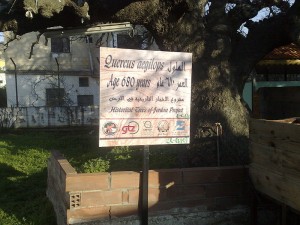A lot of what they tell you about this experience is crap, just flat-out. And even more of what they don’t explicitly tell you is crap. So I’m grateful, in retrospect, for the few scraps of great advice I got from people who have been here and done this. My recruiter, for example, who told me “It is going to be really hard. And it is going to be stupid stuff that’s really hard, like just getting through your day. And you are going to have to push yourself to get the most out of the experience. It’ll be really, really tempting to just hide in your house.”
It really, really is. There are times when it just feels unfair that everything from laundry to groceries is A Thing That Requires Major Effort. It’s very tempting to leave that all outside and refuse to go out. I succumb more often than I should.
But I do try. So today, when Um Jihad shows up at my door and says “Come on, let’s go,” I decide to be a good little volunteer and go with her, even though I have no idea where we’re going. She gives me a once-over but decides that I look presentable enough for whatever we’re doing — I know she would send me back in to change if I weren’t. I follow her down the alley and out of my compound.
Somewhat down the dusty road we pass Um Marwan slowly making her way along. Um Jihad greets the old lady and asks how her husband is doing. Um Marwan spits into the dirt and says something I don’t quite catch — but I do catch the fleeting expression of shock as it flies across Um Jihad’s face. After the social niceties have been concluded, we go on, and I realize we’re almost at Um Rafiq’s house. I am thrilled; Um Rafiq and Um Jihad are best friends and I love hanging out with the two of them together.
As soon as we’ve settled down with tea and fruit and the other essentials, Um Jihad saves me the trouble of asking for a translation by saying to Um Rafiq, “We ran into Um Marwan on the way here. I asked how Abu Marwan was doing and she was really rude.”
“Did she say ‘He’s not dead yet but I wish he were?'” Um Rafiq asks.
Um Jihad looks disappointed but confirms that this was, indeed, the gist of the conversation.
Um Rafiq chuckles. “Yeah, she’s been saying that to everyone. You can’t really fault her. He prefers his other wife and he never gave her any money.”
“He doesn’t have any money,” Um Jihad corrects her.
“Well, he still should have visited more,” Um Rafiq says. We sit in awkward silence. I am thrilled, inside my head, to realize that I understand why the silence is awkward. Um Rafiq is a first wife and her husband hasn’t visited in many years.
Eventually, Um Jihad says, “Anyway. He is dying. So we should probably visit.”
Um Rafiq looks up at me with a wicked gleam in her eye. Without breaking eye contact with me she says to Um Jihad, “You really should both go. It’s only proper.”
*=*=*=*
On the way to visit Abu Marwan, Um Jihad tells me a bit more of the story. “Abu Marwan really isn’t one of the bad ones,” she says. “He was the second of two sons. He was engaged, but then his older brother died without having had any kids. So he married his older brother’s wife.”
She looks at me, as if expecting me to be horrified or confused, but I’m familiar with the concept of what I know as Levirate marriage. I decide to use this as one of my opportunities to be subversive. I’ve invented an imaginary best friend who is a religious Jew and in citing my “relationship” with her and the classes on Judaism I took in college I’ve been able to occasionally put things out into my little universe I definitely couldn’t have otherwise. This opportunity is perfect.
“Actually,” I say, “I’ve heard about that. Some Jews do that too. You guys have a lot in common, actually.”
Um Jihad doesn’t bite, this time. She shrugs and says “Well, it’s an old thing, but he did it because he’s decent. They had some kids. But he was in love with his fiance. You can’t blame him really. The marriage was so unhappy. So eventually he married his true love, and has lived with her most of their lives. He always supported Um Marwan, of course,” she hastens to add. “But he’s old and sick and — well, she’s old and angry. She shouldn’t say what she says, but nobody really gets mad about it.”
By this point we’re at the door of the house owned by Abu Marwan and the wife I only know as Hajja. The old lady greets us warmly at the door and seems genuinely delighted to see me. I’ve never met her before but she kisses me like a long-lost daughter, over and over, on alternating cheeks. She gestures towards a fersha in a dark corner and I see teenagers scooting off of it to give us room to sit.
I look around the room and see a lot of faces I recognize vaguely but can’t quite place. As if she can read my mind, Um Jihad painstakingly tries to work her way around the room and explain where I might have met each person. “This is Abu Tawfiq, he bakes the bread… and Um Zeidun, she worked at your old school… and Abu Jilal, he’s the son of the biology teacher, remember?” I nod and try to look like I’m placing people and will remember their names.
Eventually we subside into a companionable silence. I sit with the very strange knowledge that this is the first time I’ve ever been in a gender-mixed group in a purely social setting. The family in Namus is as close as I’ve gotten, and they’re all intimately related. Apparently in the face of death it’s okay. The women are all wearing their ishaar and jelbaab, of course, and have their legs folded neatly back under them so their feet don’t show. But nobody seems particularly stressed out.
After a few minutes, the inevitable questions start. I’m not too worried because Um Jihad is there, and she has seen my temper tantrums about inappropriate questions before. She’ll allow a few borderline marriage propositions because she likes to tease me, but I know that eventually she’ll have my back. And under her skillful guiding, the conversation is actually not much about me at all, at least not in the way it often is, like a job interview from hell.
After we exhaust things that are interesting about me, the Hajja sighs and leans back against the wall. “I’m so tired,” she says.
The woman next to her, who is Marwan’s wife, pats her on her leg. “Have you slept at all this week?”
Hajja shakes her head. “Not once, not for more than fifteen minutes. It’s not as bad as what he’s going through, of course, but…”
“You can come stay with us and sleep.”
Hajja shakes her head emphatically. “You know I can’t.”
As if on cue, a choking, miserable moan comes from the darkest end of the room. It’s loud enough and so profoundly sad that I instantly understand why the Hajja can’t sleep. I allow myself, finally, to look over at the cot that has been dragged against the wall. Abu Marwan lies on it, fully clothed, under a light blanket. He is obviously not in a coherent mental state. The only parts of his body I can really see are his face, twisted in a grimace of pain, and his feet, which are swollen to twice the size of regular feet. He’s a tall man and barely fits on the cot. Next to his head is the only chair in the room and his son Marwan is sitting in it with his hand on his father’s shoulder.
After a pause, we resume conversation as if the moan hadn’t happened. A woman I don’t know says “How much longer is the American going to be in Jordan?”
Um Jihad bristles. “First of all, she speaks Arabic,” she says. “And secondly… secondly…” I realize what’s going on a split second before it happens. Um Jihad bursts into tears.
“Oh good grief,” I say. “I’m not leaving for three months. Could we please not cry until September? Because if you cry I’m going to cry too.”
She manages to choke in her sniffles and wipes her face. The others in the room look from one of us to the other. I can’t tell whether they’re impressed or disturbed by our apparent friendship.
“You could always stay and marry my son,” one woman offers.
Um Jihad makes such an outraged face that we all simultaneously start laughing. Eventually, she does too.
Abu Marwan moans again. His son pats him reassuringly on his shoulder and mutters something to him. Abu Marwan appears to mutter back, but then subsides back into silence.
A young lady I have seen at the bus stop works up her courage and says, blushing furiously, “Is this what it’s like in America, when someone is dying?”
I glance over at Abu Marwan in horror. I guess he’s too out of it to understand the conversation. It still seems kind of… blunt. But I say only “Not really. It’s very different in America now. Most people live far from their parents and grandparents. So when someone is sick, not everyone can travel to visit. And the visits would have to be short, you can’t just stay for a long illness.”
Everybody reacts as if this were both reasonable and horrible. There are times — when we discuss divorce rates, for example — that I wonder if I’m representing my country as well as I should. But I won’t lie. I do try my best. So I add, “For example, my grandmother lives many hours away from my parents by car. So when she was sick last month my father flew and spent several days with her.” This time everyone also offers their best wishes for my sick grandmother.
There is a rustling from the bed. Abu Marwan sits up, laboriously, and looks around the room without seeing anything in it. “I’m dying, aren’t I?” he asks.
Marwan rubs his father’s arm and tries to coax him back down. “Nonsense, you’ll be much better soon,” he says.
We hear footsteps outside and then a young man enters with his wife and child. He is introduced to me as one of Marwan’s brothers, and he takes Marwan’s place at the head of the bed. Marwan disappears outside and doesn’t return. I know the sons and cousins of the family are rotating through this duty, an hour or two at a time, never leaving the old man unattended. The new son also places his hand on his father’s shoulder and sits back.
His kid, however, is another story. The young boy is about four and bounces up onto the cot with no hesitation. He sits on his knees, leaning over and peering into his grandfather’s face. “Grandfather!” he half-yells. “Do you know who it is! It is your grandson! It’s Hakeem!” He repeats this procedure about every five minutes, but his grandfather doesn’t respond.
We continue our conversation about everything and nothing until Abu Marwan moans again, quietly but for what feels like forever. The new son speaks more loudly than his brother so I’m able to hear what he says. “Papa, say, ‘There is no god but God and Mohammed is his prophet.’ Go on, ‘La ilaha ila Allah.’ Say it”
Abu Marwan mutters the phrase, barely intelligible, but around the room everyone nods, as if something has been accomplished.


